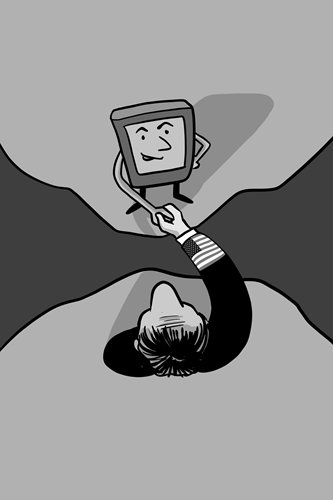
(Photo: Global Times)
If a country wants to claim a top perch as a technology leader, it should ratchet up market competition rather than obstructing rivals.
That's a sentiment seemingly shared by US President Donald Trump, who days ago tweeted, "I want the United States to win through competition, not by blocking out currently more advanced technologies." The string of social media posts, which appeared to reference Huawei, the Chinese leader in 5G technology, without naming the company, is the best manifestation of his business acumen and political farsightedness.
In sharp contrast to Trump's Democratic opponents in Washington, who have tried to hold back China's Huawei and ZTE from entering the American market by hyping up national security risks, the US president, facing a packed press corps in the White House on Friday, said that the US may consider re-opening its door to Chinese telecom vendors.
The turnaround, noticed around the world, speaks of Trump's flexibility and inclusiveness - character traits that have been nurtured and ingrained in the New York real estate magnate.
The Trump administration could take a more practical approach than the liberals on Capitol Hill.
Briefed daily by an information task force and a team of top-caliber advisors, Trump, presumably, is well informed about the global outlook for the ICT (information and communication technology) industry. Based on his tweets, Trump also knows the importance of ICT to an economy's future - including the future of the US.
Top executives from Huawei have responded to Trump's Twitter, offering 5G technology and equipment to the US market. Ken Hu, Huawei's deputy chairman, wrote: "We are ready to help build REAL 5G network in the US, though REAL competition." Now it is time for the Trump administration to accept Huawei's good will and adopt a spirit of constructive internationalism by cooperating with Huawei, rather than shunning it.
For US telecom operators and end users, there will be an economic price to pay if the US government continues to block Huawei, as Huawei's low-priced products are generally more than 15 percent cheaper than equipment from its rivals. US operators will have to pass on the high costs to American consumers.
Huawei Technologies Co, headquartered in South China's Shenzhen, started from scratch to become the preeminent global ICT leader, backed by an 80,000-strong team of scientists, technicians and engineers. With annual investment in research and development exceeding $12 billion in the past few years, Huawei has developed a unique strength in 4G TD-LTE technology, and its much-discussed 5G technology, based on the polar-code platform, has boasted faster loading speeds than its rivals in a slew of spot experiments.
China currently has the world's largest 4G mobile network, covering all cities and remote villages, which has helped deliver a highly dynamic market for e-commerce, mobile payment and social media.
The digital boom is widely believed to have contributed to China's economic resilience.
Realizing its huge development potential, the Chinese government has rolled up its sleeves to deploy 5G networks. Rollouts have been seen in major cities including Shenzhen, Shanghai and Beijing. Aided by quick speeds, 5G is expected to accelerate the birth of new technologies, including big data, artificial intelligence (AI) and the Internet of Things (IOT) as well as new businesses such as remote medicine and driverless cars.
All this has become possible because of 5G technology from Huawei. The company announced last week it has signed more than 30 contracts to roll out 5G gear across Asia, the Middle East and Europe.
It seems that no country wants to miss out on 5G. The high-stakes technology is too important to a country's economic future.
Apparently, US President Trump has realized the significance of 5G, calling on American companies to step up their efforts, lest the world's largest economy be left behind.
The world's ICT equipment market is now rather concentrated, with only five vendors - Huawei, Nokia, Ericsson, ZTE and Samsung. Of them, Huawei has the most advanced 5G technology and the strongest equipment production capacity, enabling it to supply dozens of markets simultaneously.
As to the wild allegations that Huawei's mobile equipment could be used to peep into and usurp end users' privacy and sensitive government information, security illustration labs like those Huawei has set up in Britain and Germany could also be established in the US market, so that regulators there can conduct on-site security monitoring.
In a nutshell, now it is time for the US and its Western allies to reconsider their political posturing and blocking of Chinese ICT manufacturers and to repair their fraught relationship with Huawei. It is unethical to block Huawei just because it has the most advanced technology.


